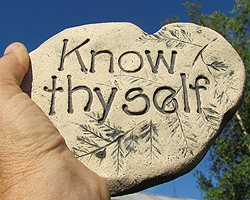 Many are familiar with the famous ancient Greek adage: “Know thyself.” Countless philosophers and spiritual teachers as well have used this theme. To my best recollection, I first came across this aphorism while reading Plato in a philosophy course my first year in college. Interestingly, this aphorism was also used by the ancient Egyptians, who gave it a religious connection. In the temple of Luxor (1400 BC) is the inscription: “Man, know thyself … and thou shalt know the gods.”
Many are familiar with the famous ancient Greek adage: “Know thyself.” Countless philosophers and spiritual teachers as well have used this theme. To my best recollection, I first came across this aphorism while reading Plato in a philosophy course my first year in college. Interestingly, this aphorism was also used by the ancient Egyptians, who gave it a religious connection. In the temple of Luxor (1400 BC) is the inscription: “Man, know thyself … and thou shalt know the gods.”
The importance of self-awareness and self-control also can be found in other religious systems. In the Buddhist tradition one reads: “Though one should conquer a million men on the battlefield, yet he, indeed, is the noblest victor who has conquered himself.” (Dhammapada 103)
In the Taoist scripture are the following words: “He who knows others is wise; He who knows himself is enlightened. He who conquers others has physical strength; He who conquers himself is strong.” (Tao Te Ching 33) In Hinduism we find: “. . . when a man has discrimination and his mind is controlled, his senses, like the well-broken horses of a charioteer, lightly obey the rein.” (Katha Upanishad 1.3.3-6)
Among the Hebrews we see the importance of self-control in the words of Solomon; “…he that ruleth his spirit [is mightier] than he that taketh cities.” (Pv 16: 32) In the Christian spiritual and monastic tradition both of these attributes self-awareness and control are to be richly cultivated. This is beautifully summarized by the spiritual perception of the Eastern Church Father Nikitas Stithatos who tells us: “Five senses characterize the ascetic life: vigilance, meditation, prayer, self-control and stillness.” (Philokalia IV, p. 103)
Some may hold the misconception that successful outcomes, whether in personal life, professional life or spiritual life, are easy or automatic. This is far afield from the truth. Success, no matter how measured, requires passion and hard work.
The outcome of cultivating self-awareness and control is told by St. Diadochos of Photiki: “Self-control is common to all the virtues, and therefore whoever practices self-control must do so in all things….it is necessary to cultivate not only the bodily virtues, but also those which have the power to purify our inner man.” (Philokalia I, p. 266) Thus as we come to know ourselves better, we know more what areas in our lives are in need of more control.
Source: Orthodoxnet.com Blog



















